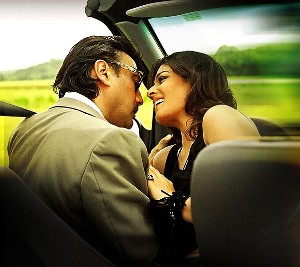
 |
 From the opening reels of the film in an institution for the mentally handicapped, we are made aware of the abnormal going-ons. Director Shashi Ranjan manages to create a gloomy and dismal environment suitable to the tone of the film. His constant use of anecdotes such as references to the film, ‘Ek Duje Ke Liye’, and the mocking portrayal of the current overflow of melodramatic television serials are effective. We are introduced to Raveena’s character, Riya, escaping from a mental institution to meet Jackie Shroff’s character, Ranbir. Ranbir, a television serial writer, is married to Anjali (Mahima Chaudhry). Based in Bombay, Riya manages to convince Ranbir that they must visit Goa to meet their alleged son. A confused Ranbir leaves his wife and begins his journey with his former girlfriend. The premise of the film although interesting, but where the film falters is the script. The screenplay lacks the conviction to behold the viewer for the runtime of the film. The slow pace of the film and the lack of plot development does not help either. Raveena and Jackie’s journey to Goa tends to drag at places and the Jackie-Mahima sub-plots add no value to the script of the film. The film also lacks lighter moments - not that you miss the forced Johnny Lever humour. The Gulshan Grover-Raveena Tandon track should have been completely avoided. It is neither funny, nor effective. The only relief provided is the item song by (an ageing) Alisha Chinai, Mahima and Muammar Rana - good music and cinematography add a fair bit of glamour to the sluggish screenplay.
- Raveena’s unrequited love towards Jackie and the revelation of his marriage to Mahima.
- Mahima’s revelation of her one night stand with Muammar Rana. Ranjan relies heavily on the use of flashbacks to develop his characters. Although effective in some instances, such as Ranbir and Riya’s previous associations, in Dobara these generally don’t assist in plot development. Now to the performances: Raveena is terrific as Riya. Her portrayal of Riya’s insecurities, obsession and dismay are a revelation. She makes you feel for the character and the viewer understands her actions. A performance like this towards the close of her career reminds us of the various shades of this talented artist. Her confrontations with Mahima are first-rate, with Raveena’s performance standing-out by far. Mahima is a pleasure to watch as Anjali. Fitting the character to the ‘T’, she is in full form here as Ranbir’s wife. However she does tend to extend her ‘Dil Kya Kare’ act further as the insecure, but uncompromising wife. Perhaps she needs to be more mindful of the projects she signs up, to avoid portraying stereotypical performances. We all know, from her performances in films such as Pardes and Lajja she is capable of so much more than always playing second fiddle to the lead actresses. Jackie Shroff delivers a fine performance as Ranbir. His performance as a torn between these rather aggressive and responsive women. Although ageing, Jackie is comfortable in the character. Its hard to imagine if some of his contemporaries like Anil Kapoor and Sanjay Dutt playing mature characters, as they still prefer to prance around with actresses half their age. Muammar Rana in a special appearance is strictly okay. His character is underdeveloped and disappears in a flash. His wooden performance does not add to his character’s credibility either. Seema Biswas, as warden of the mental asylum, is wasted in an insignificant role. Another highlight of the film is the music. The lack of aggressive promotion have not stirred much popularity, however Anu Malik’s music is tuneful and suitable to the theme of the film. Lyrics penned by Javed Akhtar are sensitive. Amongst the tracks, ‘Hamnasheen’, ‘Goonja Hua sa’ and ‘Mujhse Kyon Roothe ho’ stand out.
Perhaps not for the script, but this mature portrayal of relationships is definitely worth a watch for the strong performances from the protagonists.
|
| Comments | Contact Us | Advertise | Terms of Service | Privacy Policy |